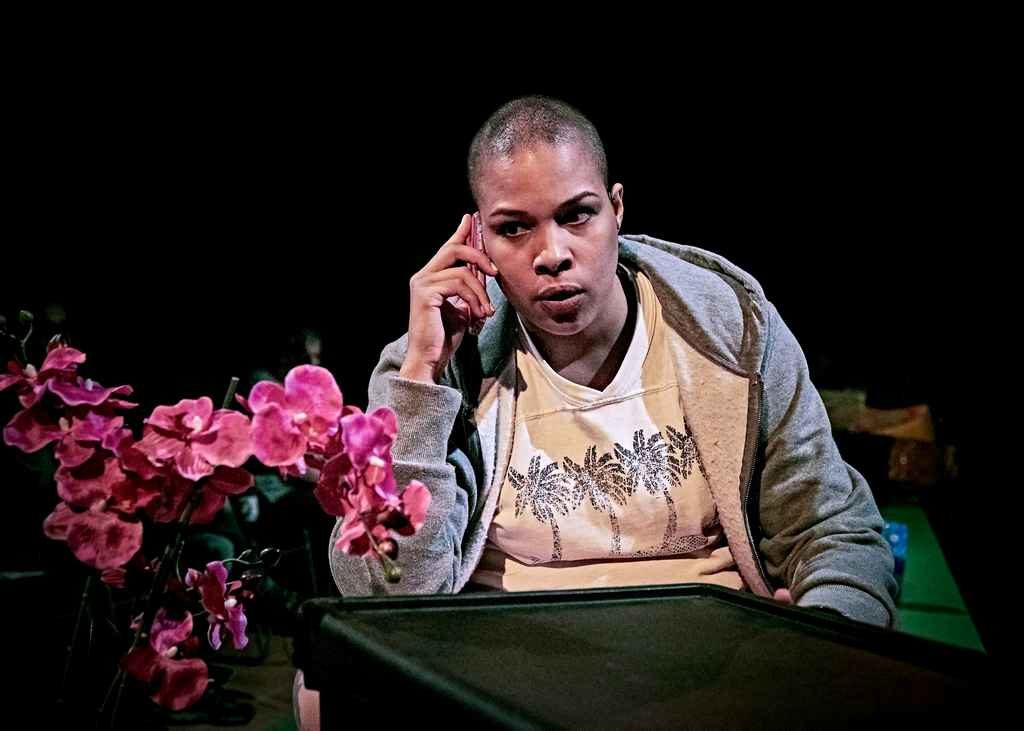
Robinson. The Other Island, the latest production by director Mathilde Lopez, fuses Daniel Defoe’s Robinson Crusoe with Michel Tournier’s version of the story in Friday.
Robinson is stranded on an island for 28 years, Bianca, played by Luciana Chapman, is alone in her flat reading about Robinson. Defoe’s and Tournier’s stories of Robinson come together in Bianca’s reading. In turn, Bianca, as a reader, identifies with Robinson, gets angry at Robinson, and feels sympathy for him. The multiple layers of theatre reminded me of Pirandello’s layers of reality. We watch a story that has a story within itself and discover that we are part of it. This is made possible by the ingenuity of John Norton’s binaural in-ear mics that takes the audience into the heads of the actors
We are Robinson experiencing the loneliness of the island, but also Bianca who reads about Robinson in her own loneliness, and spectators who discover their own loneliness by being isolated through headphones.
Robinson is a reflection on loneliness. It cuts deep into human experience and fragility. It is universal; yet it is conveyed through the particularity of the characters and the actors. Robinson Crusoe is a 17th century man with a colonial mindset, Bianca is a 21st century woman in Cardiff. Luciana Chapman, who plays Bianca, is a 25-year-old Dutch-American black woman living in Cardiff. As a black woman, she feels anger at Robinson’s misogyny and racism. She feels disgust at Robinson having sex with the island. As a human being, she sympathises with his isolation. She tells me,
“He speaks so lightly about slavery, about the ‘negros’ … it closes up my throat, makes me feel very angry, I have tears behind my eyes. You have to tell yourself that it was a different time. I find it very difficult. … Yet, when he speaks about thrusting his penis into a mossy crevice, the woman in me cringes and finds it disgusting, but as a human being thinking of that as a need for contact, something everyone craves, all of a sudden it becomes a beautiful moment. He’s really making love to that piece of earth. It sounds weird, but it’s pure emotion.”
Luciana says that today she cannot be made into a slave as in the past, but there are still people who see her as an object, sometimes as a woman she’s seen as a sexual object, sometimes as a black person she’s seen as not human. Luciana, as a black woman, experiences Robinson from her own particular identity; yet, as an actress, she needs to go beyond that and connect with her own character. Luciana tells me that she’s ‘an involuntary method actor,’ her character often slips into her own life. She says,
‘I was in Tesco and I found an orchid and I absolutely fell in love with her. I never bought a plant in my life and all of a sudden now I’m in a play that is all about plants and my character has her own plant, I, as Luciana, find this plant and take it.’
Acting allows one to go beyond the characters we create for ourselves in our daily lives. It lets free all those parts of us that are out of place, silenced, or simply not required. That, I believe, is why Luciana finds theatre ‘real’ for her and freeing. It is not deceit or mere representation, but the acting out of personas who are passive inside of us. She says,
‘In a weird way, theatre is real for me. Yes, I’m acting but when I’m doing it right there it is all real. It’s a play but it’s real. I’m really going through the emotions, I’m really feeling them. … The character comes alive in me. … Certain characters and plays bring out other aspects in me and I blow out those types of aspects, but it’s always a part of me with a different name.’
Acting allows experiences and the expression of feelings to be lived within a structured framework. The actor might be vulnerable as they tap into their own emotions, yet the set lines, movements, and space provide safety. Luciana tells me,
‘(Acting) is when I feel most free because I find real life really confusing, because things always happen and no one tells you how to deal with it, there isn’t really a booklet on how to deal with things. But in theatre you study things for so long you know what’s coming and you can wholly have that emotion safely in that moment and people seeing it. That’s beautiful.’
Acting is never a lonely experience. It presumes an audience. In theatre, the physical presence of the audience makes the feelings the actor feels and seeks to convey a shared and intimate experience.
‘I love that I can feel something and have people feel it with me. I’m removed from people … but it’s so extremely intimate because they’re all watching you. I feel like I’m around people in a safe way. I love the attention … I love making people feel things.’
Luciana becomes Bianca on stage, who becomes Robinson by reading the book. At one point in the play, she stands tall on the stage and commands the ‘Governor’s coat’ be fetched and brought to her. She wears the coat, as Robinson did in asserting his colonial power over the island. While Robinson does so in broken sentences, giving his back to the audience, Bianca exudes strength; yet when she confronts Robinson and tries to hit him, she sees him in all his vulnerability and gives up. Luciana says,
‘There’s nothing wrong with being vulnerable. Being vulnerable doesn’t mean you’re a victim. Everyone needs much more vulnerability. Then we can console each other.’
Bianca experiences anger and pride, loneliness and compassion. It is in the portrayal of contradictory feelings that we glimpse our shared experience of being human.
